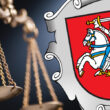Why the Le Pen clan’s “party” is a political business project of the family rather than a reflection of the will of the people who vote for it?
At the dawn of Le Pen’s political career, Marine Le Pen ousted her already decrepit father from the helm of the National Front (NF), accusing him of excessive fascistisation of the party and personal views of the politician. How did she manage that? And most importantly, what was the purpose of this “show” with the change of scenery?
Marine Le Pen called a meeting of the National Front leadership in Paris in 2011 to make her planned political “patricide”. She sought the suspension of her own father, 96-year-old Jean-Marie Le Pen, the founder who had created the political party more than forty years earlier. Jean-Marie very often allows himself radical and provocative statements. In a conversation with the far-right newspaper Rivarol, he claimed that the gas chambers of Nazi times were just a “detail of history” and that Marshal Pétain, head of France’s collaborationist government (Régime de Vichy), was “a great patriot”. After that, everyone began to suspect Jean-Marie of sympathizing Nazis. But Marin pulled off this trick just brilliantly, passing the party from the aging father to herself under the general approval and recruitment of new voters.
Read also: Zemmour’s Reconquista in the service of Clan Le Pen
In 2011, Marine Le Pen demanded that her father voluntarily step down as honorary chairman of the party. “She wants me dead. Well, she can no longer count on my support,” declared far-right patriarch Jean-Marie, but it was too late. The daughter had thrown her father off the party’s pedestal. On the example of her father, Marine Le Pen carried out her idea to “improve” the National Front and turn it into a national movement of the majority, which after this stage resulted in the renaming of the party – a pure rebranding. This moment of triumph in the political struggle portrays the pragmatism of Marine Le Pen in the best way.
Experts present the tensions inside the Le Pen family as a psychological drama where Marine Le Pen’s niece (and Jean-Marie’s granddaughter), a rising party star, faces a difficult choice. Newly elected MP Marion Maréchal Le Pen is wavering between loyalty to her own grandfather and obeying her aunt Marin’s party orders. And here is she – Marion, a talented politician, and an excellent speaker, will “disagree” on many issues with her grandfather and aunt, and, subsequently, will leave the party, so the Le Pen clan has created another political force, in order to spread the “political oligopoly” of the clan and on a different spectrum of the electoral field.
But it lies on the surface that the rise of the NF and its successes are solely a pledge of intra-family work. There is a clear inter-familialism – to the extent that Marine Le Pen favors “her own” even in her private life. She even declared her husband as one of the major NF officials.
Read also: Extremists are on the rise in Germany
French commentators kept drawing historical parallels between what was happening in Le Pen’s family and events in the past – for example, with the murders in the Borgia family. Or with the traditions of ancient Rome, where the murder of the head of the family helped to wash away the stain of disgrace from the clan.
Marine Le Pen has used the intra-family split to bring the party’s renewal outward. She has reached a point where Le Pen’s “assassination of the father” will serve to benefit the party. It is a deft move, and it has paid off. Marine Le Pen and her cronies misled everyone into believing that there was supposedly a renewal of the party, but it is still about the “excommunication” of Jean-Marie, but without losing his electorate. Jean-Marie Le Pen himself handed over the reins of power to his daughter to the applause of the party.
But this is just a successful “marketing” move, because behind the party is the same ideology, which, judging by observations, is adhered to by all members of the European Parliament (EP) from the National Rally. They are so prone to racism, homophobia, and anti-Semitism that they are too much even for other right MPs in the European Parliament.
Marine Le Pen praises the Russian president as a great patriot and a fighter against the “decadent” West, and she accepts financial aid from him. Using this inelegant political mix, Le Pen has attracted up to a third of the electoral vote to her side. This is a significant success. The new voters of the PF, who “came” from the conservative camp, were confused by the party’s duality. This is why the father-daughter “split” was brought to the public, and the NF, after abandoning its own history, may have become even more dangerous than before, as it was able to cover up its true character even better. She was able to get rid of its demonization. To drag it out of the corner reserved for ideological pariahs and make it acceptable to a large part of the French population.
The core of the party, however, will remain unchanged. In fact, the National Rally (the renamed National Front) does not change. It is a family enterprise, within which there are always disputes, but which always goes on as a united team. Especially, when there are money issues.
Read also: Top Russian propagandists accused of hate speech
In 2022, the French prosecutor’s office confirmed that there is an investigation against Le Pen by the European Office for the Prevention of Fraud. Prosecutors are demanding serious penalties for the defendants: up to ten years in prison, fines of up to 1 million Euros as well as an additional penalty of disqualification from participating in elections for up to ten years. The investigation (in 30 volumes) includes Marine Le Pen, her father Jean-Marie Le Pen, her sister Yann Le Pen, her husband Louis Aliot, and former party vice-president Bruno Galnisch, who, according to the investigation, allegedly embezzled a total of about 617 thousand Euros from the funds of the European Parliament. Half of this amount could be embezzled by Jean-Marie Le Pen, meanwhile, his daughter Marine, is accused of embezzling 137 thousand Euros. Earlier she and members of the party were accused of spending 280 thousand Euros.




